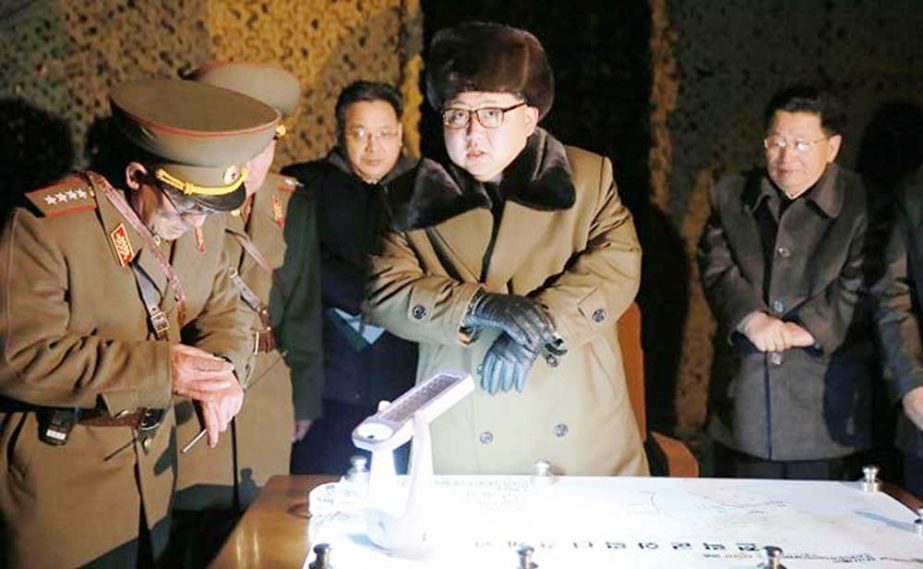
AFP, Washington :Recent satellite images of North Korea’s main nuclear complex show suspicious activity that could be linked to re-processing plutonium for additional nuclear bombs, a US think tank said on Tuesday.Analysis of the images focused on exhaust plumes from a steam plant used to heat a radiochemical laboratory facility at the Yongbyon complex. The facility is used for processing plutonium from a five-megawatt reactor at Yongbyon into weapons-grade fissile material.Whether the exhaust plumes mean “re-processing additional plutonium is under way or will be in the near future remains unclear”, analysts at the US-Korea Institute at Johns Hopkins University concluded.However, they noted a recent statement by US National Intelligence Director James Clapper that North Korea could be ready to extract weapons-grade plutonium from the nearby reactor’s spent fuel rods in a matter of weeks.North Korea mothballed the Yongbyon reactor in 2007 under an aid-for-disarmament accord, but began renovating it after its third nuclear test in 2013.Satellite imagery analysis by another US think tank in January suggested the reactor was still not operating at full capacity. When fully operational, the reactor is capable of producing around six kilos (13 pounds) of plutonium a year — enough for one nuclear bomb, experts say.North Korea has carried out four nuclear tests — the most recent on January 6, when it announced it had detonated its first hydrogen bomb.Experts have disputed the H-bomb claim, saying the yield from the test was far too low for a full-fledged thermonuclear device. However, the report noted that in Feb. 9 congressional testimony, the director of U.S. National Intelligence, James Clapper, had said North Korea could begin to recover plutonium from spent fuel at Yongbyon “within a matter of weeks to months.”The prospect of North Korea acquiring more plutonium will be looked on with concern by members of the United Nations Security Council, including Pyongyang’s sole major ally, China. The council agreed to tough new sanctions on North Korea after it conducted its fourth nuclear test on Jan. 6 and a long-range rocket launch a month later.At a nuclear security summit in Washington last week, U.S. President Barack Obama, South Korean President Park Geun-hye and Japanese Prime Minister Shinzo Abe vowed to ramp up pressure on Pyongyang in response to its recent nuclear and missile tests.North Korea rejects criticism of its nuclear and missile program and its leader Kim Jong Un said last month it would soon test a nuclear warhead and ballistic missiles capable of carrying nuclear warheads.Experts at 38 North, a website run by the Johns Hopkins University’s School of Advanced International Studies in Washington, predicted in February last year that North Korea’s nuclear weapons stockpile could grow to 20, 50 or 100 bombs within five years, from an estimated 10 to 16 weapons at that time.Meanwhile, One month after the adoption of sweeping sanctions at the United Nations Security Council, North Korea is calling for negotiations with the United States.Pyongyang issued a long statement through its National Defense Commission, calling for an end to hostilities, Yonhap reported.”Maintaining stability is more urgent than unilateral sanctions, and providing negotiations can find a better solution than reckless military pressure,” North Korea said in the statement.The statement marks a departure from the warmongering rhetoric from North Korea in February and March, when state media threatened to turn Seoul into “powder” and suggested South Korean President Park Geun-hye be assassinated.The statement also comes on the heels of tests of several short-range projectiles in March.Officials in Seoul have said North Korea tested Scud and Rodong missiles, as leader Kim Jong Un provided field guidance at practices meant to target the South.South Korea has not ruled out the possibilities of a fifth nuclear test.The North Korean statement, issued on Sunday, included the use of what South Korean media described as “unprecedented” words, including “stability” and “negotiation.”Moon Sang-kyun, spokesman for Seoul’s defense ministry, told reporters Monday the statement was “very long,” but dismissed the call for talks with the United States. There has been a “gap between words and behavior” from the North in past instances, and therefore a lack of credibility in the statement, Moon said.Yang Moo-jin, a professor of North Korean studies in Seoul, said the North is claiming that it hasn’t felt the impact of sanctions while showing its “preparedness” for dialogue.The lengthy announcement is also likely a reflection of internal circumstances in North Korea in a run-up to the Seventh Party Congress, to be held in May.The United States has said negotiations with North Korea are possible only if Pyongyang decides to turn away from its diplomatic and economic isolation and commits to denuclearization.

